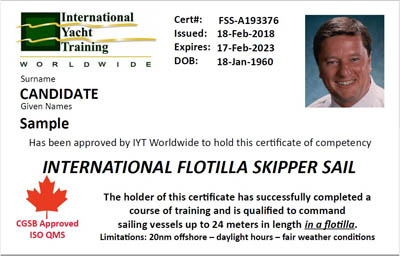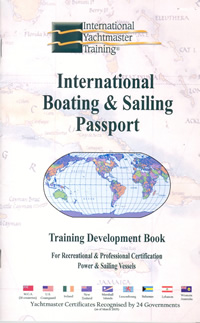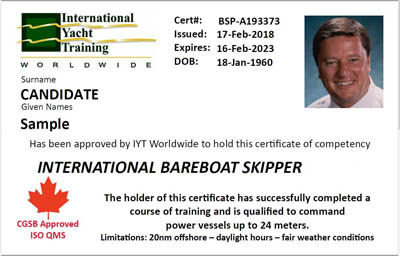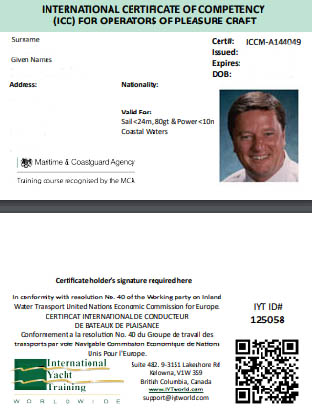The IYT Flotilla Skipper Certificate
This is an entry level skipper certificate. There are no nationality restrictions or mandatory prior requirements for this certificate, although it is expected that people should already have relevant prior experience and should be at least at a crew level. 
It is open to anyone of 18 years and older, and on the yacht you will be issued with an IYT Log Book, the, "International Boating & Sailing Passport", which details the full syllabus of the Recreational Training Programme. This is also a Log where you can record the details of the sailing and training that you do.
The Flotilla Skipper covers from Modules 1 to 26, and at the end of the training, a Gold Seal and School Stamp is added as evidence of course completion.
You must either already have a VHF licence to apply for this certificate or you must complete the IYT one as detailed.
Modules are both theoretical and practical, and prior to completing the course you must complete an on line eLearning course, which is currently free of charge. The eLearning Theory and training up to Modules 26 cover the same content as for the Bareboat Skipper, with the main difference being that you need less practical experience to get to this standard.
Over the week, you will cover items like
- living on board a sailing yacht, and on board safety
- sailing and yachting terminology
- responsibilities of a Watchkeeper/Flotilla Skipper
- man overboard procedures
- how to tie knots and handle ropes correctly,
- the points of sail, and general wind and weather awareness
- how to steer a yacht under sail and power, including marina mooring
- handling the sails, mooring and anchoring,
- charts, chartwork, pilot books, and the magnetic compass,
- buoyage and collission regulations
- taking over a vessel and vessel checkout
- crew safety briefing and general crew management.
- basics of tides
- preparing a short passage
- use of VHF
- any other aspects relevant to
gaining an International Watchkeeper/Flotilla Skipper Certificate.
Assessment will be on an ongoing basis over the week and at some stage there will be a multiple choice written test on the eLearning Theory. By the end of the week successful candidates should be competent to take charge of, and to skipper a yacht themselves in a Flotilla environment.
An IYT Flotilla Skipper Certificate will be applied for after passing the assessment. This will be issued directly by IYT and currently costs about 30US$. Certificates are sent free of charge by air mail post, with additional fees if a courier is used. Where you may also be getting a VHF certificate, both will be applied for at the same time. Fees are paid directly to IYT who will email you a link for payment once the certificate is applied for.
All IYT certificates must be renewed every 5 years to ensure that contact details and photos are up to date, and this is done directly with IYT.
Once you have obtained a Flotilla Skipper it is intended that for your first few times going out as skipper, that you should sail in company of other yachts where there are more experienced Skippers to advise and assist you. This can either be as part of a Flotilla on a future holiday, but it could equally be sailing in company with friends.
Once you have obtained sufficent experience you can then still charter a yacht on your own at a later stage with this certificate, without sailing with other yachts. You can see that it is on the list of approved Skipper licences in Croatia for Bareboat Charter at number 35a. You can view this list here.
Many people however will want to upgrade to a higher level Skipper certificate at this stage, and in this regard the Flotilla Skipper Certificate is a perfect stepping stone for a beginner to work up to a Bareboat Skipper level.
To do any IYT training you must
- register as a Student which is free of charge and which you can do here
- If you need to do the Radio Licence, you can find the VHF eLearning here
- You can find the Flotilla Skipper eLearning here




.gif)



